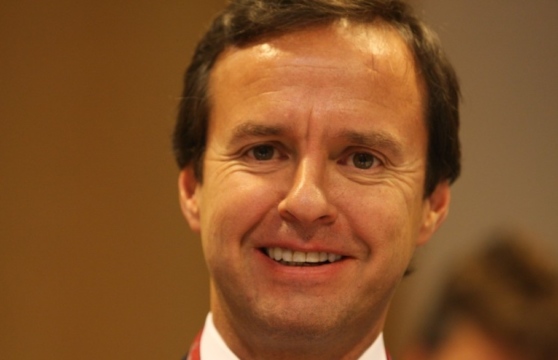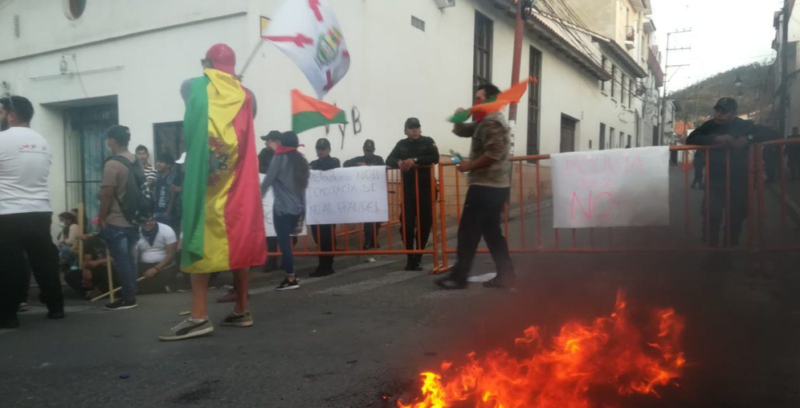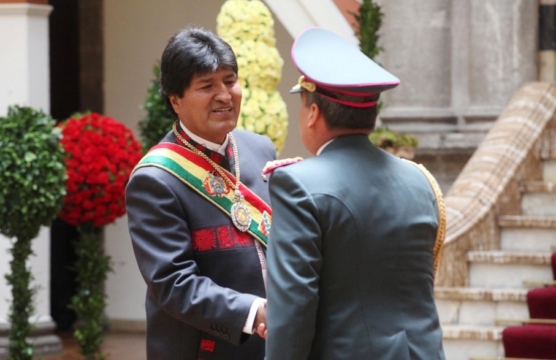
A Conversation with Jorge Quiroga
In early October, Morales announced he will run for a third presidential term . Is democracy under seige?
A Daily Publication of The Dialogue
Violent protests erupted this week across Bolivia amid confusion over the results of Sunday’s presidential election. On Wednesday, with nearly 98 percent of the ballots counted, current President Evo Morales had 46.76 percent of the vote, exactly 10 percentage points ahead of rival Carlos Mesa, avoiding a runoff. Morales on Wednesday claimed an outright victory in the first round, although the opposition and international observers have expressed concern about the electoral counting process. Was the election free and fair? What will it take to restore calm? What do the results imply for Bolivia’s legislature and the country’s governability in the coming years?
Raúl Peñaranda U., director of news portal Brújula Digital: “The current Bolivian government put most of the members of the Supreme Electoral Tribunal in their positions, and those members are now accused of committing fraud in favor of President Evo Morales. They are accused of making Morales’ margin of victory over Carlos Mesa just over 10 percent in order to avoid a runoff. On Sunday night, those same members of the electoral body inexplicably suspended the transmission of the results with 83 percent of the vote counted when Morales was leading with 45 percent to Mesa’s 38 percent, a margin of just seven percentage points. After a 24-hour interruption, the difference increased just enough to avoid a second round (in which Mesa has a better chance of winning). To avoid a runoff, a presidential candidate must get at least 51 percent of the vote or 40 percent with a 10-percentage-point margin. Two rapid-count systems also showed a difference of about five percentage points between Morales and Mesa, which led many to believe a second round would be assured. Therefore, the new result, with 95 percent of the votes counted, generated such outrage that there was violence in various parts of the country. This included fires at electoral offices and at the ruling party’s headquarters. If an outright victory by Morales is confirmed, citizens will become even more inflamed. If Morales manages to secure a fourth term, he will have to govern with an opposition Chamber of Deputies, as the opposition factions will together have a majority. A tie in the Senate, with 18 members on each side, might mean paralysis. Additionally, Morales must bear the weight of illegitimacy—not only for the irregularities of this election, but also for having gone against the result of the 2016 referendum in which voters rejected allowing Morales to run for another term this year.”
Christina Ewig, professor of public affairs and faculty director of the Center on Women, Gender and Public Policy at the Humphrey School of Public Affairs at the University of Minnesota: “There are grave concerns about the fairness of Bolivia’s election on Sunday. The OAS noted that the campaign was unfair due to Evo Morales’ use of government resources to support his campaign. And, of greater concern is the sudden change in election results. On Sunday night, the TSE stopped updating its website at 83.76 percent of the preliminary count—when results pointed to a runoff. Suspecting fraud, opposition supporters surrounded departmental counting sites in an effort to guard the vote, and rival Carlos Mesa voiced skepticism. When reporting resumed 24 hours later—incorporating rural votes which are a traditional MAS stronghold—Morales appeared to have won in the first round, by a mere tenth of a percent. News of this razor-thin victory led to swift, and at times violent, protests on both sides—opposition supporters claiming fraud and Morales supporters defending the win. The TSE results are different from both the quick count by Viaciencia (a private firm that the TSE authorized to perform a parallel count) and the independent count by the University Mayor de San Andrés and the Jubileo Foundation—both of which indicated a second round. Finally, this turnabout occurred in a context marked by distrust in government institutions and in the Morales government’s democratic commitment, given the questionable constitutionality of his fourth run for president. Boiling below the surface of the current conflict are two contrasting views of democracy. While the opposition views Morales as an increasingly authoritarian leader, MAS supporters fear that the political and social inclusion of indigenous and other groups previously excluded from Bolivian politics could be reversed with a return of elite politicians like Mesa. Even with a first-round win for Morales, the new legislature will likely be polarized with the MAS winning a lower number of seats than the two-thirds it has historically achieved. This divided outcome will necessitate political negotiation. Yet, the current protests bode for even deeper polarization in the coming days, and in turn, will make governability very difficult, at least in the short term.”
Daniel E. Moreno, executive director of Ciudadanía, Comunidad de Estudios Sociales y Acción Pública in Cochabamba, Bolivia: “The election was free, with no restrictions limiting participation of any candidates or voters. There were some denouncements of candidates being unable to campaign in some rural areas controlled by the unions that are part of MAS, but they don’t seem to have had an impact on the overall results. The TSE fairly administered the election. During the campaign, the TSE failed to sanction what many believed to be the misuse of public funds and resources in the MAS campaign, which used many more resources than any other political party. The lack of confidence in the TSE, if it isn’t solved by convincing explanations, will mark the future of Bolivian democracy both in the face of a possible runoff election and in the face of the upcoming department and municipal elections. Regardless of the ultimate result, the winner will have to establish alliances with other political forces in order to govern. No single party has control of the legislature, and while MAS is close to having the majority in both chambers, it will face the need to negotiate with other parties in order to approve some legislation. If Mesa is elected president, his party’s negotiation skills will have to be able to win over some MAS lawmakers if it wants to govern. In either case, this election means that decisions will not be made by a single hegemonic party, as has been the case over the last 10 years, but rather as a result of political negotiations.”
Gonzalo Mendieta, partner at Mendieta Romero & Asociados law firm in Bolivia: “Except for the detention in Santa Cruz of more than 100 militants from an opposition alliance, elections were held peacefully and freely. However, Evo Morales openly used the state machinery to further his campaign. It was not exactly a fair competition. A second round could reduce the current political stress. However, to get there, confidence in the electoral tribunal must first be restored. The present electoral authorities seem irreversibly discredited. Second, government hardliners are either sure Morales won or simply fear a second round. A deal is urgently needed at least to make the electoral counting process more reliable with neutral international aid. To that end, replacement of members of the electoral tribunal might also be needed, as odd as that may look in the middle of an electoral process. If this impasse is ultimately solved, a divided government may impair any president’s governability in the coming years. This is either because he may not control Congress or simply because a strong social coalition will be out of reach for any of the contenders. The winner runs the risk of ending up as a mere placeholder, unable to craft lasting alliances with Bolivian power politics players and focused more on his short-term survival. Besides, neither Morales nor Mesa appears to have the muscle to cope with needed economic measures, which though not imminent, loom on the horizon.”
The Latin America Advisor features Q&A from leaders in politics, economics, and finance every business day. It is available to members of the Dialogue's Corporate Program and others by subscription.
In early October, Morales announced he will run for a third presidential term . Is democracy under seige?
With Morales’ approval rating at 75%, it is likely that voters will re-elect him for a third consecutive term
Bolivian President Evo Morales won re-election with an estimated 60 percent of the vote. What can investors expect?
 Since Sunday’s presidential election, Bolivians have taken to the streets in protest, accusing President Evo Morales of trying to steal the election. // Photo: ABI.
Since Sunday’s presidential election, Bolivians have taken to the streets in protest, accusing President Evo Morales of trying to steal the election. // Photo: ABI.
